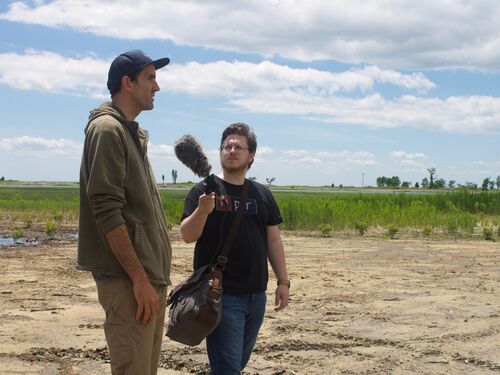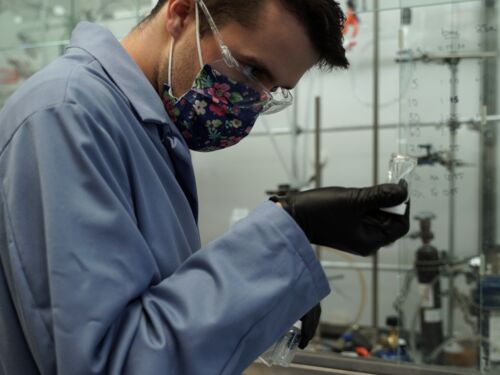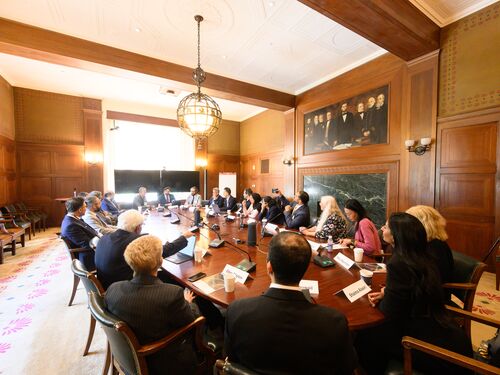Advancing the U.S. Electricity System: New Forum to Explore Challenges and Solutions
Feature Story
By Josh Blatt
Last update March 25, 2025
The U.S. grid is undergoing tremendous changes to incorporate new technologies, meet growing demands for electricity, and improve reliability. These changes are prompting a host of questions for grid operators, policymakers, and utilities — from how to ensure access to critical grid components to how to leverage state-of-the-art advanced technologies.
The National Academies are launching a new forum to explore emerging challenges for the U.S. electricity system and discuss solutions. It will bring together leaders and experts from across the sector to consider new investments, technological advancements, and policy strategies for future grid development, among other topics. The first public events will be held on April 1, 8, and 16.
The forum will be staffed by Brent Heard, a senior program officer with the National Academies’ Board on Energy and Environmental Systems, who has led several of the Academies’ recent electricity-focused studies and activities. In advance of the first meeting, we asked Heard about the evolving electricity landscape and the goals for the initiative.
What challenges are emerging in the electricity space right now?
Heard: To start, we’re seeing electricity demand growth for the first time in decades, which presents a pretty fundamental change to how the grid is used and managed. At the same time, we’re seeing the system face increasing reliability challenges from many directions, including extreme heat events, storm systems, and new technology demands. So, we’re trying to balance the need to build out the system to meet growing demand, modernize and strengthen the grid for reliability, all while striving to ensure electricity is affordable and clean. It’s a formidable balancing act, and one where I hope our forum can provide helpful insights and advice for the grid operators, utilities, and regulators grappling with this.
Heard: To start, we’re seeing electricity demand growth for the first time in decades, which presents a pretty fundamental change to how the grid is used and managed. At the same time, we’re seeing the system face increasing reliability challenges from many directions, including extreme heat events, storm systems, and new technology demands. So, we’re trying to balance the need to build out the system to meet growing demand, modernize and strengthen the grid for reliability, all while striving to ensure electricity is affordable and clean. It’s a formidable balancing act, and one where I hope our forum can provide helpful insights and advice for the grid operators, utilities, and regulators grappling with this.
What are the main goals or objectives of this initiative in engaging people from across the electricity sector? Does this forum help fill a gap?
Heard: You know, there isn’t one building you can walk into and talk to the person who runs the electricity system. The system is comprised of a wide variety of actors — and it’s growing every day. As one example, the digital technology and software sectors are now increasingly involved in shaping the future of the system in a way they weren’t just a handful of years ago. It is important to note that the grid also looks very different in different places — from technology mixes, state policy goals, and also governance bodies for the system in different states. So, the forum and its activities are striving to provide a common space to share experiences, successes, and challenges.
Heard: You know, there isn’t one building you can walk into and talk to the person who runs the electricity system. The system is comprised of a wide variety of actors — and it’s growing every day. As one example, the digital technology and software sectors are now increasingly involved in shaping the future of the system in a way they weren’t just a handful of years ago. It is important to note that the grid also looks very different in different places — from technology mixes, state policy goals, and also governance bodies for the system in different states. So, the forum and its activities are striving to provide a common space to share experiences, successes, and challenges.
Who is involved with this initiative? How do you see it growing or evolving?
Heard: We’re grateful to have a forum membership consisting of experts from a variety of organizations and perspectives. Not only do we have some of the leading experts on the electricity system as members of this group, we have members coming from state regulatory bodies, investor-owned utilities, and consortiums who are grappling with the complexities and exciting future potentials for our electricity system. These forum members have really exciting ideas for activities that can engage electricity system operators and decision-makers, and we’re excited to be able to create an opportunity where important conversations about the grid’s future can happen.
Heard: We’re grateful to have a forum membership consisting of experts from a variety of organizations and perspectives. Not only do we have some of the leading experts on the electricity system as members of this group, we have members coming from state regulatory bodies, investor-owned utilities, and consortiums who are grappling with the complexities and exciting future potentials for our electricity system. These forum members have really exciting ideas for activities that can engage electricity system operators and decision-makers, and we’re excited to be able to create an opportunity where important conversations about the grid’s future can happen.
Do you think the forum can help create a common understanding between key actors with different interests?
Heard: Throughout my work focusing on electricity systems for the National Academies, I’ve continued to hear about the value that information sharing in a trusted space can bring to this sector. So, I’m excited to work with our chair, Varun Rai, Walt and Elspeth Rostow Professor at the University of Texas at Austin, to help create those spaces through this forum. I’ve always been heartened to hear from staff in federal agencies, but also [from] experts in industry and working at the state level, that they reference National Academies reports and use materials coming out of our convenings. That we can be a trusted source for a variety of people — many of whom have different objectives and different visions for what our future electricity system looks like — means a lot to me. It’s trust we don’t take for granted.
Heard: Throughout my work focusing on electricity systems for the National Academies, I’ve continued to hear about the value that information sharing in a trusted space can bring to this sector. So, I’m excited to work with our chair, Varun Rai, Walt and Elspeth Rostow Professor at the University of Texas at Austin, to help create those spaces through this forum. I’ve always been heartened to hear from staff in federal agencies, but also [from] experts in industry and working at the state level, that they reference National Academies reports and use materials coming out of our convenings. That we can be a trusted source for a variety of people — many of whom have different objectives and different visions for what our future electricity system looks like — means a lot to me. It’s trust we don’t take for granted.
Why is this a good time for these discussions?
Heard: I’m excited that we have this electricity forum now, because it will allow the National Academies to be more dynamic and responsive in our activities — especially at a time when the electricity system is changing so quickly. There’s a ton of value in the thoughtful deep dives that [our] consensus studies provide, but that also necessarily takes some time. This forum is an exciting exercise in engaging with the electricity system community in a faster, but still thoughtful, way.
Heard: I’m excited that we have this electricity forum now, because it will allow the National Academies to be more dynamic and responsive in our activities — especially at a time when the electricity system is changing so quickly. There’s a ton of value in the thoughtful deep dives that [our] consensus studies provide, but that also necessarily takes some time. This forum is an exciting exercise in engaging with the electricity system community in a faster, but still thoughtful, way.
How does the forum build upon other work from the National Academies?
Heard: The Board on Energy and Environmental Systems has multiple decades of work advising the electricity community, most recently with consensus studies on the future of electric power, net metering’s role in the system, and new and advanced nuclear power. We’ve also convened workshops on grid operability under increasingly complex conditions and how AI and data centers are affecting electricity use and emissions. Looking to the future, we hope to develop activities on long-duration energy storage approaches, as well as coal-to-nuclear plant repowering.
Heard: The Board on Energy and Environmental Systems has multiple decades of work advising the electricity community, most recently with consensus studies on the future of electric power, net metering’s role in the system, and new and advanced nuclear power. We’ve also convened workshops on grid operability under increasingly complex conditions and how AI and data centers are affecting electricity use and emissions. Looking to the future, we hope to develop activities on long-duration energy storage approaches, as well as coal-to-nuclear plant repowering.
You can learn more about the Forum on Informed Investment, Technology, and Policy Pathways for the Electricity System and Interdependent Energy Infrastructure and register to attend upcoming events here. To learn more about the Board on Energy and Environmental Systems, engage with its work, or sign up for its newsletter, please visit the board’s website.
Related Resources
More like this
Discover
Events
Right Now & Next Up
Stay in the loop with can’t-miss sessions, live events, and activities happening over the next two days.
NAS Building Guided Tours Available!
Participate in a one-hour guided tour of the historic National Academy of Sciences building, highlighting its distinctive architecture, renowned artwork, and the intersection of art, science, and culture.



